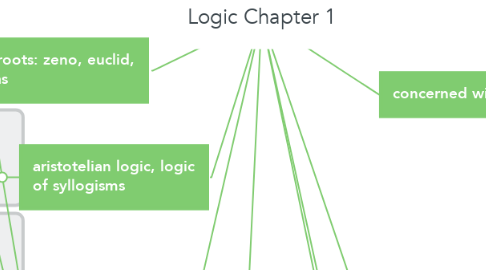
1. historical roots: zeno, euclid, pythagoras
1.1. zeno's paradoxes
1.1.1. paradox: conradiction derived from valid reasoning/true premises
2. aristotelian logic, logic of syllogisms
2.1. syllogism= deductive argument, 2 premises and a conclusion
3. argument
3.1. invalid arguments
3.1.1. not necessary that if premises are true conclusion is true
3.2. valid arguments
3.2.1. if premises are true, conclusion is true
3.3. collection of statements in which the conclusion follows from the premises
3.3.1. premises intended to prove the conclusion
3.3.1.1. conclusion is main claim
3.3.2. statements are declarative sentences
3.4. sound arguments
3.4.1. valid argument in which all premises are true
3.5. unsound arguments
3.5.1. either invalid or has one false premise
3.6. deductive argument
3.6.1. premises intended to guarantee conclusion
3.7. inductive argument
3.7.1. premises intended to make conclusion probable without guaranteeing it
4. counterexamples and invalidity
4.1. invalid arument form
4.1.1. one that has some invalid substitutions
4.2. to an argument form is a substitution instance in which premises are true and conclusion is false
4.3. good counterexample
4.3.1. premises are well known truths and conclusion is well known falsehood
4.4. fallacy of affirming the consequent
4.4.1. invalid argument form
4.4.1.1. if a, then b. b. so a.
4.5. fallacy of denying the antecedent
4.5.1. invalid argument form
4.5.1.1. if a, then b. not a. so, not b.
4.6. categorical statement
4.6.1. relates two classes or categories where a class is a set or collection of things
5. concerned with reasoning
5.1. good deductive reasoning = truth preserving
6. forms and validity
6.1. argument form is a pattern of reasoning
6.2. substitution instance is an argument that results from uniformly replacing variables w statements
6.3. valid argument form is one which every substitution is a valid argument
6.4. formally valid argument is one that is valid in virtue of its form
6.5. conditional statement = if/then
6.5.1. if = antecedent
6.5.2. then = consequent
6.6. negation = its denial
7. famous forms
7.1. modus ponens
7.1.1. if a then b. a. so b.
7.2. modus tollens
7.2.1. if a then b. not b. so not a,
7.3. hypothetical syllogism
7.3.1. if a then b. if b then c. so if a, then c.
7.4. disjunctive syllogism
7.4.1. either a or b. not a. so, b. OR either a or b. not b. so, a.
7.5. constructive dilemma
7.5.1. either a or b. if a then c. if b then d. so, either c or d.
8. strength and cogency
8.1. strong argument
8.1.1. probable but not necessary that if the premises are true then the conclusion is true
8.2. weak argument
8.2.1. not probable that if the premises are true then the conclusion is true
8.3. cogent argument
8.3.1. strong argument, all premises are true
8.4. uncogent argument
8.4.1. one that is either weak or strong, at least one false premise
8.5. deductive logic
8.5.1. concerned with evaluating arguments for validity and invalidity
8.6. inductive logic
8.6.1. concerned with evaluating arguments for strength and weakness

